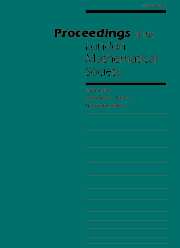CLASSICAL LIE SUPERALGEBRAS OVER SIMPLE ASSOCIATIVE ALGEBRAS
Published online by Cambridge University Press: 18 April 2006
Abstract
Over arbitrary fields of characteristic not equal to 2, we construct three families of simple Lie algebras and six families of simple Lie superalgebras of matrices with entries chosen from different one-sided ideals of a simple associative algebra. These families correspond to the classical Lie algebras and superalgebras. Our constructions intermix the structure of the associative algebra and the structure of the matrix algebra in an essential, compatible way. Many examples of simple associative algebras without an identity element arise as a by-product. The study of conformal algebras and superalgebras often involves matrix algebras over associative algebras such as Weyl algebras, and for that reason, we illustrate our constructions by taking various one-sided ideals from a Weyl algebra or a quantum torus.
- Type
- Research Article
- Information
- Copyright
- 2006 London Mathematical Society
Footnotes
- 2
- Cited by




